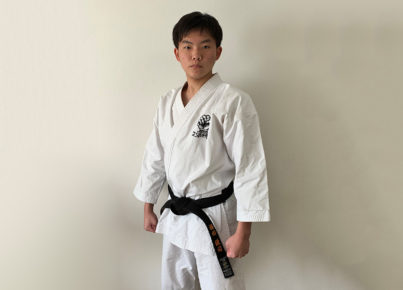“Beyond Boundaries : TYCA Unifying Asia”
Riandara Pratama Gilang
University Student (Production of Film & TV Department)
Indonesia
My ‘Toshiba Youth Club Asia’ experience in the winter of 2017 is something I’ve often revisited in my mind. I have found myself continually reapplying the knowledge and understanding I gained from my short week in the club three years ago. With a global pandemic ravaging our societies and destabilizing our political institutions, I increasingly believe the younger generation has a responsibility to both speak out, and act on, change. The first lesson I learned at TYCA 2017 was how important our backgrounds were in founding our values and beliefs. Heritage and background should be preserved at all costs, but it is also the most significant source of division we humans continue to face. However, we all had a common aspiration; building a more peaceful and prosperous Asia.
The COVID-19 pandemic has already had many grave consequences for Asian countries: Many hospitals are overflowing and underequipped, economies are receding, and the scramble for vaccines is only adding on to the tension in South East Asia. Even before the pandemic, we agreed that a unified Asia would benefit all. Now, this line of thought holds more accurate than ever before. Addressing the COVID-19 pandemic is such a massive task to undertake that international collaboration seems to be the only viable solution. Looking to the long-term, countries should prioritize the UN’s sustainable development goals, to not only build healthier societies, but also a more prosperous Asia. When constructing a timeframe to mark objectives, it would be crucial to keep in mind that the implementation of green policies in a small country such as Singapore would be nowhere near as challenging as in a large, spread-out country like Indonesia. Asian countries are at different stages of development, so even though unity in the face of Covid is necessary, the responses that countries implement should be tailored to their socio-economic needs. Backcasting involves coming up with a desired vision of the future by working backward and identifying specific policies and actions that greatly inspired us. We think reflecting on our past is essential to shaping the steps we make in the future as individuals, communities, and nations because we can avoid repeating our predecessors’ mistakes.
In particular, my group in TYCA was inspired by the UN’s notion of Peace, Justice, and Strong Institutions. When thinking of specific institutions that inspire me in a policy-making sense, my mind darts to the EU, a unifying body that stands for freedom, equality, and democracy. The EU’s investment in a unified Europe has turned them into a more substantial economic and cultural power. The continent of Asia holds almost 60% of the global population; If unified, countries could benefit from open borders and free trade while promoting a distinct Asian identity. Organizations such as ASEAN are crucial in the right direction and should be a source of focus for Asian politicians. However, before we can become an interconnected, free continent, we must first unite behind the same values of liberty and equality. The Asian identity we should invest in post-covid-19 is one of democracy and justice. We cannot afford to tolerate authoritarians and despots in an organization that espouses freedom for all. Nevertheless, backcasting allowed me to identify policies elsewhere that Asian countries could benefit from in the future. This is a useful skill that I have continued to apply since TYCA.
Finally, with the previous paragraph in mind, the final lesson from TYCA I’d like to discuss came from our experience with the game ‘Logy&Nomy’. Its ingenious structure reminded us of the importance of trade-offs in decision making. When creating a vision for Asia’s future, we need to consider what trade-offs we are and aren’t willing to make on our path. This is especially applicable to the conflict between economic development and environmental sustainability, especially in a post-COVID-19 society. The best way to successfully build a unified society is to take advantage of the incredible diversity Asia holds. People with different perspectives, backgrounds, and skills can all contribute to a common goal. The consequences of ignoring environmental policy will reach farther than any individual country’s borders, so we need a multilateral response. ‘Logy&Nomy’ ends after eight rounds, but our planet will continue to suffer for countless if we don’t change our approach. In conclusion, my TYCA experience is something I continue to return to. The knowledge I gained and the lessons I learned were invaluable, especially in our current socio-political climate. With vaccines being distributed, there can be some slight optimism for the future, but that optimism must be met with action. Asian countries need to put themselves in a position to build sustainable societies and resistant economies. A focus on transitioning to renewable energy would have two wide-reaching benefits in Asia: Governments could move away from their over-reliance on fossil fuels (a resource that will soon become scarce). They can work towards becoming green societies. The post-Covid-19 world will present Asia with a crossroads, and it is imperative that we walk down the right path.
2017年冬の「東芝ユースクラブアジア」での経験は、私の心の中に何度も蘇ってきます。3年前(*執筆当時)の短い1週間で得た知識と理解を、活用し続けていることに気付きました。世界的なパンデミックが私たちの社会を荒廃させ、政治体制を不安定化させている今、若い世代には声を上げ、行動する責任があると考えるようになってきました。TYCA 2017で学んだ最初の教訓は、価値観や信念を築く上で、私たちの背景がいかに重要であるかということでした。伝統や背景は何としてでも保護されるべきものですが、一方でそれはまた、私たち人間が直面し続けている分裂の最も大きな原因でもあります。しかし、私たちは皆、共通の志を持っていました。それは、より平和で豊かなアジアを築くというものです。
COVID-19のパンデミックは、アジア諸国に多大な影響を与えています。多くの病院は患者であふれ、設備も不十分で、経済は後退しており、ワクチンを求めての奔走は、東南アジアの緊張感に拍車をかけています。パンデミックが発生する前から、私たちはアジアとして統一することが、すべての人の利益になるという考えに賛同していました。今、この考えは以前にも増して正しいものとなっています。COVID-19パンデミックに対処することは、非常に大きな任務です。だからこそ、国際的な協力が唯一の有効な解決策であるように思われるのです。長期的に見ると、各国は国連の持続可能な開発目標を優先させ、より健康的な社会を構築するだけでなく、より繁栄したアジアを築くべきでしょう。目標を設定するための時間的枠組みを構築する際には、その国の規模を考慮すべきです。例えば、シンガポールのような小さな国で環境に関する政策を実施することは、インドネシアのような広大な国での実施に比べて難しいということを念頭に置いておくことが重要です。アジア諸国はそれぞれに発展段階が異なるので、コロナ対策で共通認識を持つことは必要ですが、各国の社会経済的なニーズに合わせた対応が必要です。「バックキャスティング」とは、過去にさかのぼって、自分たちに大きなひらめきを与えてくれた政策や行動を具体的に洗い出し、望ましい未来像を考えていくことです。過去を振り返ることは、個人、コミュニティ、国家として未来に向けての一歩を踏み出すために不可欠だと考えています。
特にTYCAの私のグループは、国連の「平和、正義、強力な機関」という概念に触発されました。私が政策立案という範疇において、刺激を受ける具体的な機関を思い浮かべる時、私の頭の中には、自由、平等、民主主義を掲げる統一機関であるEUが浮かんできます。EUの統一されたヨーロッパ内での投資は、EUをより実質的な経済的・文化的集団に変えました。アジア大陸は世界人口の60%近くを占めており、統一されれば、各国はアジアのアイデンティティーを強調しながら、開放された国境のもと、自由貿易の恩恵を受けることができます。ASEANのような組織は、正しい方向に向かうために非常に重要であり、アジアの政治家にとっても注目すべきものです。しかし、相互に連結した自由な大陸になる前に、まず自由と平等という同じ価値観の下に団結しなければなりません。COVID-19後のために投資すべきアジアのアイデンティティは、民主主義と正義です。万人のための自由を謳う組織の中で、権威主義者や専制君主を容認する余裕はありません。それにもかかわらず、バックキャスティングによって、他の地域での政策で、アジア諸国が将来的に恩恵を受けることができるものを見つけることができました。これは私がTYCAに参加してからずっと実践している有用なスキルです。
最後に、前段落を踏まえた上で、TYCAからの最後の教訓として、「Logy&Nomy」というゲームを体験したことを紹介したいです。その独創的な構造は、意思決定における取引の重要性を再認識させてくれました。アジアの未来のビジョンを描く際には、ビジョン達成のための道を歩んでいる時に、やりたい取引、やりたくない取引がどのようなものか、を考える必要があります。特にCOVID-19後の社会において、経済発展と環境の持続可能性の両立を図るのが難しいことに当てはまります。統一された社会を構築するための最善の方法は、アジアが持つ信じられないほどの多様性を活用することです。異なる視点、背景、スキルを持つ人々が、共通の目標に向かって貢献することができるでしょう。環境政策をないがしろにすると、一国を超えた問題になることが安易に予測できるので、多国間での対応が必要です。「Logy&Nomy」は8回を回ったところで終了しますが、私たちがアプローチを変えなければ、地球は数え切れないほどの被害を受け続けることになるでしょう。
結論から言うと、私のTYCAでの経験は、生活の中で継続的に生きています。私が得た知識と学んだ教訓は、特に現在の社会政治情勢において、計り知れないほど貴重なものとなりました。ワクチンが配布されるようになったことで、将来に少し楽観的な見方ができるようになりましたが、その楽観的な見方には行動が伴わなければなりません。アジア諸国は、持続可能な社会と強い経済を築けるだけの力をつけていく必要があります。再生可能エネルギーへの移行に焦点を当てることは、アジアにおいて 2 つの広範な利益をもたらすでしょう。政府は、化石燃料(間もなく希少になる資源)への過度の依存から脱却することができます。また、環境に優しい社会に向けて努力することも可能になります。COVID-19後の世界は、アジアに岐路を示すことになり、私たちが正しい道を歩むことが絶対的に必要なのです。








